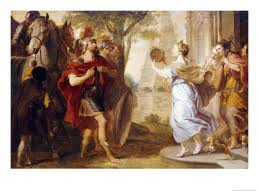O Jephthah, judge of Israel, what a treasure hadst thou!
—William Shakespeare, Hamlet, Act II, Scene 2
Finding Heroes
It’s hard to pick heroes. They tend to have feet of clay. New historians or biographers regularly uncover padded expense accounts, unorthodox beliefs, or children born out of wedlock. The motives of Columbus, the faith of George Washington, and the politics of Teddy Roosevelt have all been questioned by more than one scholar. It’s hard to know when we should concede the clay feet (and maybe the clay legs with them) and when we should fight for the reputation of our heroes. Sometimes there’s too much information to sort through; usually there’s too little. Unless they are evangelical pastors or missionaries, our heroes rarely leave us heartfelt confessions of faith written in orthodox and unambiguous language. Their public speeches usually reflect the public ideals of their own day and tell us little of the men and women themselves. Even their private papers rarely provide an unimpeachable testimony to their private convictions and ultimate concerns. In the end, it’s very hard to know why A did X, even if X was a very, very good thing.
The heroes of faith held up to us in Scripture are certainly men and women who struggled with sin. But in most cases we can see God’s validation of a ministry, a career, or a life devoted to His service. In most cases, God unambiguously honors His saints. But then we come across someone like Jephthah.
 Jephthah’s Beginnings
Jephthah’s Beginnings
Jephthah’s story begins some 300 years after the Exodus. Israel had emerged from yet another affair with apostasy. She had put away her idols and was finally willing to fight for her freedom. The Ammonites, her current overlords, did not approve. They prepared a military strike to subdue Israel completely. Israel’s western tribes assembled their militia to meet the Ammonite army. But the elders of those tribes realized they lacked something they considered important: a war leader. And then they thought of Jephthah.
Jephthah was born in Gilead—in what we call Transjordan. He was the son of a prostitute. Sometime in his youth, his father’s family expelled him from their clan and community. Jephthah escaped into the land of Tob and there became something of a brigand or freebooter. A band of “vain men” gathered about him; he became their captain. Jephthah learned how to use a sword, how to command warriors, and how to win a battle. He gained experience—probably on the Ammonite border—and he earned a reputation for valor. In many respects, Jephthah foreshadowed David in his wilderness adventures.
When the elders of Gilead asked Jephthah to serve as their captain, his response was less than enthusiastic: “Didn’t you hate me and expel me from my father’s house? Why have you come to me now that you’re in distress?” (Judg. 11:7).
The elders were blunt. “We need you to fight for us against the children of Ammon. We need you to be our head” (v. 8). They had no other options.
Jephthah pushed for clarity: “So if you bring me home to fight against the children of Ammon, and Yahweh delivers them up before me, I’ll be your head?” (v. 9). The elders of Gilead swore by Yahweh that they would honor the deal. Jephthah went with them. At Mizpeh the elders and people made him their captain. “And Jephthah uttered all his words before the LORD in Mizpeh” (v. 11). That is, Jephthah made his new role and responsibilities the subject of a solemn oath to Yahweh.
Jephthah the War Leader
Jephthah began his campaign with careful diplomacy rather than rash violence. He sent messengers to the Ammonite king. They asked in Jephthah’s name, “What have you to do with me that you’ve come to fight against me in my land?”
In answer the king of Ammon claimed that the children of Israel had stolen Ammonite land when they came out of Egypt. Ammon wanted it back. Hearing this, Jephthah sent another round of messengers. They rehearsed in great detail the actual history of Israeli-Ammonite-Amorite interaction (vv. 14-23). Jephthah reminded the king of Ammon that Yahweh had given Israel Amorite land. Israel hadn’t set a foot on any territory belonging to Ammon or to their cousins, the Moabites. Jephthah’s message displayed a detailed knowledge of Israel’s history as it’s recorded in Numbers and Deuteronomy. Jephthah knew the Torah.
Jephthah’s conclusion was less than politic, though: “Will you not possess whatever your god Chemosh gives you to possess? And whatever Yahweh our God gives us to possess, that we will possess” (v. 24). This wasn’t polytheism; it was a slap in the face. Chemosh had failed to protect them during a previous invasion (Num. 21:29). Ammon’s god was a failure. Yahweh had a proven track record. Did Ammon really want to make a contest between the two of them now?
Finally, Jephthah pointed out the timeline. Israel had controlled the west bank of Jordan for 300 years. If Ammon had any claims on the land, it was far too late to press them now. It would be best for Ammon if her armies stayed home.
Of course, the king of Ammon had a different view of the past as well as the present. He refused to stand down. Jephthah gathered his forces and headed for the Ammonite army. Scripture says he did this after the Spirit of Yahweh had come upon him (v. 29). This is important for what happened next.
Jephthah’s Daughter
As he faced the enemy, Jephthah made a vow to Yahweh. He said, “If You will without fail deliver the children of Ammon into my hands, then whatever comes forth from the doors of my house to meet me… shall surely be Yahweh’s and I will offer it up for a burnt offering” (v. 31). Yahweh gave Jephthah total victory over the Ammonites, and he thoroughly subdued their forces and their cities. Then he went home in triumph.
His only daughter came out to greet him. She met him with timbrels and dancing. When Jephthah saw her, he tore his clothes in anguish and cried out, “Alas, my daughter!” He told her about his vow, and said, “I have opened my mouth unto Yahweh, and I can’t go back!” (v. 35).
Jephthah’s daughter acquiesced immediately. After all, God has saved Israel by her father’s hand. But she asked for one thing. “Leave me alone two months so that I may go up and down on the mountains and bewail my virginity, I and my companions” (v. 37). Jephthah consented.
After two months his daughter returned, and he “did with her according to his vow which he had vowed: and she knew no man” (v. 39).
Hero or Villain?
So what are we to make of Jephthah? He stands accused by countless commentators of many terrible sins: rashness, profanity, ignorance of Scripture, superstition, human sacrifice, Moloch worship, and murder. But over against this, we have the witness of the New Testament. The writer of Hebrews however reckons Jephthah as a hero of faith, right beside David and Samuel (Heb. 11:32). How is that possible? Let’s take a closer look.
First, Jephthah knew Scripture well. He couldn’t have been ignorant of God’s law against human sacrifice (Lev. 18:21; 20:2-5; Deut. 12:31; 18:10). Human sacrifice wasn’t a light offense. Even in Israel’s later decline during the time of Ahab and his heirs, it produced great revulsion in those that witnessed it (2 Kings 3:27).
Second, Jephthah was clothed with the Spirit of God when he made his vow. Such an anointing involves God’s favor and empowering. We ought to assume that to some degree the vow was actually prompted and blessed by God’s Spirit.
Third, Jephthah expected to be greeted by another human on his return. The “whatever” is more properly “whoever.” Besides, Israelites didn’t keep dogs in their homes; they were unclean. Jephthah probably expected his servants would be the first to greet him.
Fourth, the Hebrew word translated “burnt sacrifice” (`olah) doesn’t mean burnt and doesn’t imply death. It means “ascent.” The offering ascends to God. Abraham offered Isaac as an `olah without actually killing him (Gen. 22; Heb. 11:17). That is, he surrendered him wholly to God. As we read between the lines in Scripture, we see that this wasn’t at all unusual. Hannah gave Samuel wholly to the Lord when he was very young (1 Sam. 1). There are references to women who served at the Tabernacle (Ex. 38:8; 1 Sam. 2:22). And in Luke’s Gospel we meet Anna, who served in the Temple day and night with prayers and fasting (cf. Luke 2:37).
Fifth, Jephthah’s daughter wasn’t anxious about her impending death, but about her childless future. Delitzsch writes, “To mourn one’s virginity does not mean to mourn because one has to die a virgin, but because one has to live and remain a virgin.” In other words, the girl didn’t expect to die: she expected to live the rest of her life as a virgin dedicated wholly to God’s service.
Sixth, Jephthah “did with her according to his vow” (v. 39). He vowed to give her to Yahweh. The inspired historian says that this is exactly what he did. That the author of Judges should equate human sacrifice with an offering to Yahweh is impossible. Jephthah gave his daughter to God, but not as a sacrifice on the altar.
Finally, we are told that the daughters of Israel went up yearly to “lament” Jephthah’s daughter (v. 40). Again the translation is poor. The word rendered “lament” means in this context to praise or celebrate. Most likely they went up to the Tabernacle to talk with her and to celebrate her living sacrifice. Jephthah’s daughter became a heroine in her own right.
A Fly in the Ointment?
Is Jephthah then a hero without flaws? Not quite. His story is part of the larger story that is Judges. The closer we get to the end of the book, the more clearly we see Israel’s desire for an earthly king, an earthly lord and savior. Some of the judges seem to lean that way as well. We can think of Gideon, for instance.
Jephthah deliberately pursued the role of head or chieftain of Gilead—even though he was barred from any such role (Deut. 23:2). His extreme anguish when his daughter met him may suggest more than a normal sadness that he would never have grandchildren. Had Jephthah hoped for a dynasty? Had he planned that his family would prove Israel’s salvation? Whatever the case, he bowed in faith to the will of Yahweh. He gave us his political aspirations as he gave up his daughter to God. His judgeship ended in six years; her ministry continued. But both served God well. That’s what our heroes ought to do.
©2012 Off the Grid News











